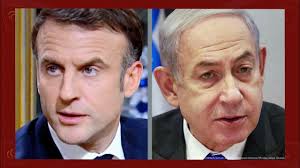
Israel PM Netanyahu Criticizes France’s Macron and Australia’s Albanese

 :
| Updated On: 20-Aug-2025 @ 12:35 pm
:
| Updated On: 20-Aug-2025 @ 12:35 pmSHARE
A major diplomatic row has erupted between Israel and France after Israeli Prime Minister Benjamin Netanyahu accused French President Emmanuel Macron of fueling antisemitism by planning to recognize Palestinian statehood. The accusation, made in a letter seen by AFP, argued that antisemitism had “surged” in France since Macron announced his intention to recognize Palestine at the upcoming UN General Assembly. Netanyahu charged that Macron’s stance amounted to appeasement, emboldened Hamas, and encouraged Jew-hatred in French society.
France swiftly rejected the claims, calling them “abject” and “erroneous.” The French presidency stressed that France has always protected and will continue to protect its Jewish citizens, while condemning violence against Jews as intolerable. Officials emphasized the need for seriousness and responsibility rather than “conflation and manipulation.” French deputy minister for European affairs Benjamin Haddad further asserted that France needed “no lessons” on combating antisemitism, warning against exploiting an issue that was already poisoning European societies. France, home to Europe’s largest Jewish community, joins nearly 145 UN member states that recognize or intend to recognize Palestinian statehood.
In his letter, Netanyahu directly criticized Macron’s diplomacy, stating that recognizing Palestine rewards Hamas terror, hardens its stance on hostage release, and puts French Jews at greater risk. This confrontation reflects broader tensions between Israel and countries moving toward Palestinian recognition.
Simultaneously, Netanyahu lashed out at Australian Prime Minister Anthony Albanese, accusing him of being a weak politician who betrayed Israel and abandoned Australia’s Jewish community. Australia recently announced plans to recognize Palestine and revoked the visa of Israeli politician Simcha Rothman, a member of Netanyahu’s governing coalition. Rothman had been scheduled to speak at events organized by the Australian Jewish Association.
In retaliation, Israeli Foreign Minister Gideon Saar revoked the visas of Australian representatives to the Palestinian Authority and announced closer scrutiny of Australian visa applications to Israel. He justified the move as a response to Australia’s recognition of Palestine and its refusal to grant visas to several Israeli figures.
Australia condemned the action as unjustified. Foreign Minister Penny Wong said Israel was isolating itself on the world stage and undermining international efforts toward peace and a two-state solution. Albanese, meanwhile, accused Netanyahu of being in denial about the humanitarian crisis in Gaza caused by Israel’s ongoing military campaign.
The United Nations also raised alarm over the worsening humanitarian situation in Gaza. UN humanitarian spokesperson Jens Laerke reported that Israel had banned essential shelter items such as tents for nearly five months, during which more than 700,000 people were displaced multiple times. Israel classified tents as “dual use,” claiming tent poles could be repurposed for military objectives.
Additionally, UN Human Rights Office spokesperson Thameen Al-Kheetan warned that Israel’s military takeover of Gaza City risked catastrophic consequences, with mass displacement, mounting civilian deaths, and growing misery. Hundreds of thousands of Palestinians were being ordered to move south to al-Mawasi, a zone previously designated “safe” but still subject to bombing.
The escalating disputes with France and Australia, combined with international condemnation over Gaza, illustrate Israel’s increasing diplomatic isolation. Analysts suggest Netanyahu’s confrontational approach highlights his government’s fragility as it faces global criticism, mounting humanitarian concerns, and domestic political strain.